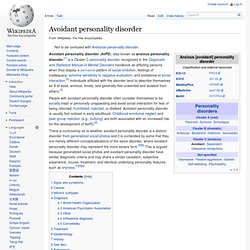

Hikikomori. Escapism. History[edit] Entire industries have sprung up to foster a growing tendency of people to remove themselves from the rigors of daily life. Many activities that are normal parts of a healthy existence (e.g., eating, sleeping, exercise, sexual activity) can also become avenues of escapism when taken to extremes or out of proper context. In the context of being taken to an extreme, the word "escapism" carries a negative connotation, suggesting that escapists are unhappy, with an inability or unwillingness to connect meaningfully with the world. However, there are some who challenge the idea that escapism is fundamentally and exclusively negative.
For instance, J. Évasion (sociologie) Avoidant personality disorder. Avoidant personality disorder (AvPD), also known as anxious personality disorder,[1] is a Cluster C personality disorder recognized in the Diagnostic and Statistical Manual of Mental Disorders handbook as afflicting persons when they display a pervasive pattern of social inhibition, feelings of inadequacy, extreme sensitivity to negative evaluation, and avoidance of social interaction.[2] Individuals afflicted with the disorder tend to describe themselves as ill at ease, anxious, lonely, and generally feel unwanted and isolated from others.[3] People with avoidant personality disorder often consider themselves to be socially inept or personally unappealing and avoid social interaction for fear of being ridiculed, humiliated, rejected, or disliked.

Avoidant personality disorder is usually first noticed in early adulthood. Childhood emotional neglect and peer group rejection (e.g., bullying) are both associated with an increased risk for the development of AvPD.[4] Signs and symptoms[edit]